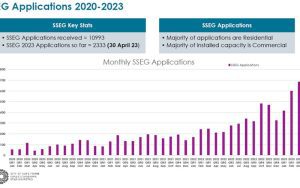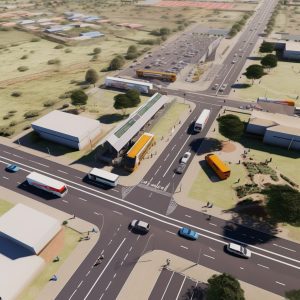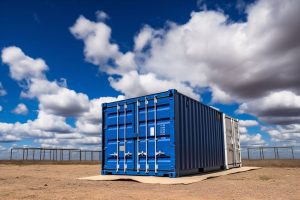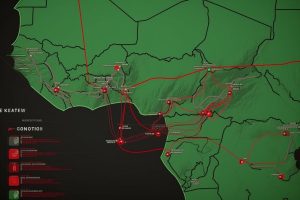As a cold front sweeps through the region, there has been a surge in electricityrelated service requests. The residents are advised to prepare for the cold, damp, and blustery conditions that are expected to persist over the weekend. The inclement weather can further worsen power service issues, leading to a rise in demand for assistance.
The South African government has expressed deep regret and concern over the ongoing electricity crisis, which has resulted in load shedding and caused hardships for citizens. However, the administration remains committed to enhancing the country’s electricity generation capacity to alleviate the severity of load shedding and its impact on people’s lives.
Cape Town is witnessing a significant increase in rooftop solar photovoltaic (PV) applications, driven by incentive programs aimed at reducing loadshedding. Mayor Geordin HillLewis has confirmed that March 2023 saw the highest number of new solar PV installation applications to date.
Loadshedding has become a persistent problem for many neighbourhoods, particularly during winter when demand for electricity increases. City officials, including energy teams, are facing a tremendous amount of pressure as they try to balance loadsheddingrelated work with regular maintenance, resulting in repairs being carried out in a shorter window, which affects services and residents.
The City of Cape Town is set to enhance urban mobility and intermodal connectivity by constructing a new integrated bus facility in Makhaza, Khayelitsha. The facility will be shared by the MyCiTi and Golden Arrow Bus Services and located adjacent to the Chris Hani rail station, with the new minibustaxi facility just a kilometre away. This initiative will streamline travel for commuters by providing seamless transfers between multiple modes of transportation.
Load shedding has become a common issue in South Africa, causing disruptions in daily life and businesses. In response, the Western Cape Government is taking proactive measures to eliminate power blackouts. The government has launched an ambitious project to provide selected towns in the province with continuous power supply and reduce the impact of load shedding.
The Kusile Power Station is an ambitious project that has been in construction for over a decade. With an estimated cost of R160 billion, it is one of the largest coalfired power stations in the world, with a capacity to generate 4,800 megawatts of electricity upon completion.
As the winter season fast approaches, South Africa braces for a surge in energy demand, which further intensifies the pressure on the stateowned power company, Eskom. Eskom has cautioned about the possible occurrence of power outages to forestall an entire collapse of the national grid.
South Africa’s power utility sector is facing significant challenges as the winter season approaches. The electricity demand is set to increase, and the threat of higher stages of load shedding looms. ## Julius Malema Calls for Return of Former Eskom Executives
Cape Town is making strides towards becoming Africa’s premier business destination, with a substantial decrease in unemployment. The city’s Mayor, Geordin HillLewis, credits this achievement to maintaining the lowest unemployment rate across the metros. However, there is still work to be done to drive further economic growth, alleviate poverty, and create additional job opportunities.
Loadshedding has become a constant source of disruption for neighborhoods, with new trends emerging as a result of high stages of loadshedding and increased demand during winter. ### Pressure on Energy Teams
In the midst of South Africa’s ongoing energy crisis, the city of Cape Town is leading the way in efforts to combat loadshedding and create a more sustainable future for its citizens. At a recent SmallScale Embedded Generation (SSEG) event, Mayoral Committee Member for Energy, Councillor Beverley van Reenen, outlined the city’s ambitious plans.
The current energy crisis in South Africa has forced citizens to consider alternative energy sources to minimize the impact of power outages on their daily lives. In response to this issue, Western Cape Premier Alan Winde proposed incentivizing solar energy installations for both homeowners and businesses during the 10th Energy Digicon.
Eskom, South Africa’s power utility, needs help in providing a stable and reliable power supply. With Stage 6 load shedding already implemented, experts predict the possibility of higher stages during the upcoming winter season. A new national standards document is being developed to guide loadshedding schedules up to Stage 16.
The Western Cape Government is bracing itself for a challenging winter season, made worse by cold weather and extended load shedding. During a Disaster Management Centre briefing, Anton Bredell, Western Cape Minister of Local Government, Environmental Affairs, and Development Planning, emphasized the importance of readiness in the face of these challenges.
South Africa faces an alarming energy crisis, with citizens experiencing daily blackouts for up to 10 hours due to current Stage 6 load shedding. The situation is becoming increasingly severe as Stage 9 and beyond protocols are being finalized, leaving citizens and experts alike profoundly concerned about the future.
















